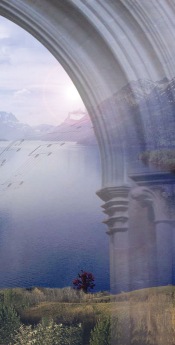Same Old Story for a New Age
 Luke Gullickson is a composer, pianist, and writer currently working on a Master’s in composition at UT in Austin, Texas. He keeps a blog, Sonatas and Interludes, where he recently pondered how “new age” can reach out and bleed into even the “avant-garde”:
Luke Gullickson is a composer, pianist, and writer currently working on a Master’s in composition at UT in Austin, Texas. He keeps a blog, Sonatas and Interludes, where he recently pondered how “new age” can reach out and bleed into even the “avant-garde”:
There’s a problem in new pretty piano music. I call it the “new age” problem. The thing is, we’ve been Jim Brickman-d, David Lanz-d, Yanni-d, and now we can’t hear Keith Jarrett the same way anymore. We are all familiar with the warm sounds of new age piano music; it’s been a weird but persistent classification. On the surface, Jarrett’s Köln Concert, the albums of George Winston, and contemporary postminimal piano music by Peter Garland or William Duckworth sound similar, but the genre underpinnings, and their associated politics, are vastly different in each case. The worlds of jazz, pop, and classical, respectively, have merged together into this zone where superficial similarities are in danger of overriding the differences in intent between these disparate artists.
The argument goes a little farther in Luke’s original post, so take a little time to read it all if you’re thinking about commenting.
(Personally, the first-mentioned few make me groan and zone… But I defy anyone telling me Tim Story‘s 2001 Shadowplay isn’t at heart a Po-Mo masterpiece.)
Our new works – Salvatori-Litchfield “When Evening Falls” (classical guitar, grand piano, cello, viola, violin, contrabass) seem to have found their audience in the so-called New Age genre…which makes me happy and yet a bit confused at the same time. I guess it reminds me of the scene from Rudolph the Red-Nosed Reindeer when Hermey and Rudolph visit the Island of Misfit Toys.
It follows logically then that if Classical Music were a hockey game, you’d find New Age in the penalty box…a fitting place of reprimand for us faux-classical dogs who simply can’t muster the AKC papers to skate in the big game with our fully pedigreed counterparts. And yet, we are lovable mutts…familiar basset-hound types who have loyal hearts and souls. We love to curl up on a rug near the fireplace, and thankfully, we each have two big floppy ears that guide our inspiration as we offer our compositions the light of day from the simple, minimal, melodic, soothing and resolving elements of music that apparently befits a genre called New Age rather than one called Classical.
So I can speak on behalf of Misfit Toys on the Island and fellow faux-classical dogs alike when I say we simply become catatonic and lugubre when our groomed and haughty classical music counterparts get all sforzando and vivacissimo on us and start to col pugno about their dissonante cadenzas. Some even go so far as to volto subito on our soave, schleppen and zart sotto voce.
I for one would be happy to settle for placement in a category of “Contemporary Classical” if we could so indulge those in the music industry who are architects of categorical references for our music. Actually, “Misfit Toysical” or “Penalty Boxical” would do just fine too.
But if “New Age” is the only slipper with the Cinderella fit for us, we’re fine wearing it to the ball while while we wait for the other Classical slipper to drop so we can perhaps finally be asked to join their exclusive dance.
It only bleeds into the avant-garde when you try to create inspired Amaranth music and the assholes at Itunes place you in the New Age genre.
Then there’s self-censorship. There was a time (before I was born, I guess) when a composer would feel bad for writing something tonal, and by the 80s composers were to feel bad for writing something “too angular.” I like to think most of us are past these false dichotomies, but if there is one place where I come close to self-censorship it’s when I hear my work and think “that’s a little new-agey.” I think I’m past that now. Creating soundscapes for visual art sorta necessitates leaving more “room” in a work, and I think that’s what got me to be OK with “gushier” sounds. Not that I’ve had a total change of direction in my music; I still love to write edgier stuff; but if part of something I write turns out to be, God forbid, soothing (shutter), I can live with that now.